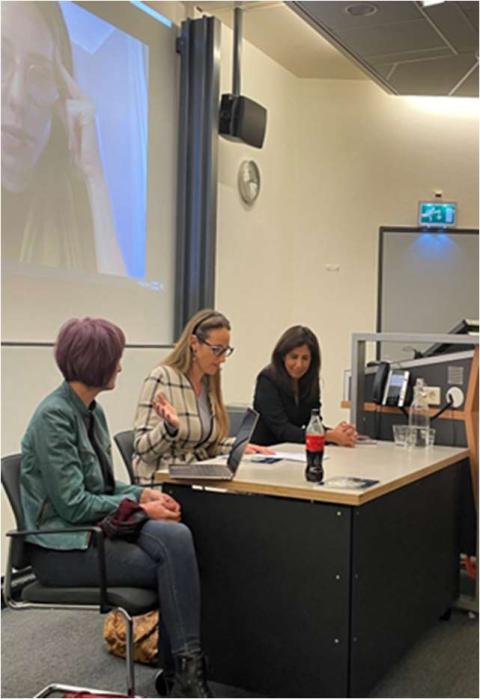On corporate human rights and environmental harm in armed conflict
With support from the Netherlands Network of Human Rights Research (NNHRR), the Department of Public Law and Governance organized a symposium on the involvement of business actors in human rights and environmental harm in situations of armed conflict and the barriers victims encounter in seeking effective redress. The symposium was organized on the occasion of Philipp Wesche’s doctoral dissertation entitled ‘Business-related human rights violations and access to justice in Colombia’, which he
defended next day on December 16th 2022. He was awarded the doctorate cum laude.
The symposium consisted of panels covering four topics:
1. The business sector, armed conflict and development
The first panel consisted of Philipp Paiement (Tilburg University, chair), Stefan Peters (Justus-Liebig-Universität Gießen & Instituto Colombo-Alemán para la Paz) and Morag Goodwin (Tilburg University). Morag highlighted the aspect of labelling a nation as post-conflict and what that means for whom. Stefan took a broader approach and stressed, among others, that we need to talk more about the role of elites. The discussion primarily focused on the perception of conflict and the (assumed) contradiction between peace and accountability in the notion of post-conflict.
2. Business actors in transitional justice: the special jurisdiction for peace
The second panel consisted of Dalia Palombo (Tilburg University, University, chair), Sabine Michalowski (University of Essex) and Leena Grover (Tilburg University). Sabine was positive about the way Philipp’s dissertation brought the impunity of economic actors to the foreground, as well as how they are often referred to as ‘third party actors’ and thereby give the erroneous impression that economic actors are not part of the conflict. Leena in contrast focused on the international aspect and asked what, if anything, international law is expected to do about the fact that domestic initiatives fall short. The discussion centred on the role of the international community and transitional justice.

3. Rights of nature, indigenous communities and environmental justice
The third panel consisted of Ximena Arenas (Tilburg University, chair), Jonathan Verschuuren (Tilburg University) and Marie Petersmann (Tilburg University). Marie talked about the rights of nature and how the West perceives indigenous relations to nature. Jonathan took a legal viewpoint and discussed whether or not nature (e.g., rivers) should have legal standing. If current rights are often violated, is it not better to focus on enforcing these rights instead of adding new rights? The discussion elaborated on this and questioned whether too much emphasis is put on nature rights.
4. Access to justice for human rights defenders and community leaders in conflict-affected areas
The fourth and last panel consisted of Tamara Horbachevska (Wageningen University & Yaroslav Mudryi National Law University, chair), Maria Carolina Olarte (Universidad de los Andes) and Miriam Saage-Maaß (European Center for Constitutional and Human Rights). Maria focused on litigation and the scope of concepts such as remedies and damage. Furthermore, she spoke about the different opportunities in business and constitutional law. Whereas Miriam looked at due diligence and transnational legal avenues. The discussion further added the dynamics between the local level and global law, and barriers to access justice.
Philipp Wesche’s dissertation consists of four papers (all open access):
- Wesche, P. (2019). Business actors, paramilitaries and transitional criminal justice in Colombia. International Journal of Transitional Justice, 13(3), 478-503. https://doi.org/10.1093/ijtj/ijz016
- Welsche, P. (2021). Business actors and land restitution in the Colombian transition from armed conflict. The International Journal of Human Rights, 25(2), 295-322. https://doi.org/10.1080/13642987.2020.1773441
- Wesche, P. (2021). Rights of nature in practice: A case study on the impacts of the Colombian Atrato River Decision. Journal of Environmental Law, 33(3), 531-555. https://doi.org/10.1093/jel/eqab021
- Wesche, P. (2022). Post-war violence against human rights defenders and state protection in Colombia. Journal of Human Rights Practice, 13(2), 317-338 https://doi.org/10.1093/jhuman/huab018
Philipp Wesche was supervised by Nicola Jägers (Tilburg University) and Daniel Augenstein (Tilburg University).
